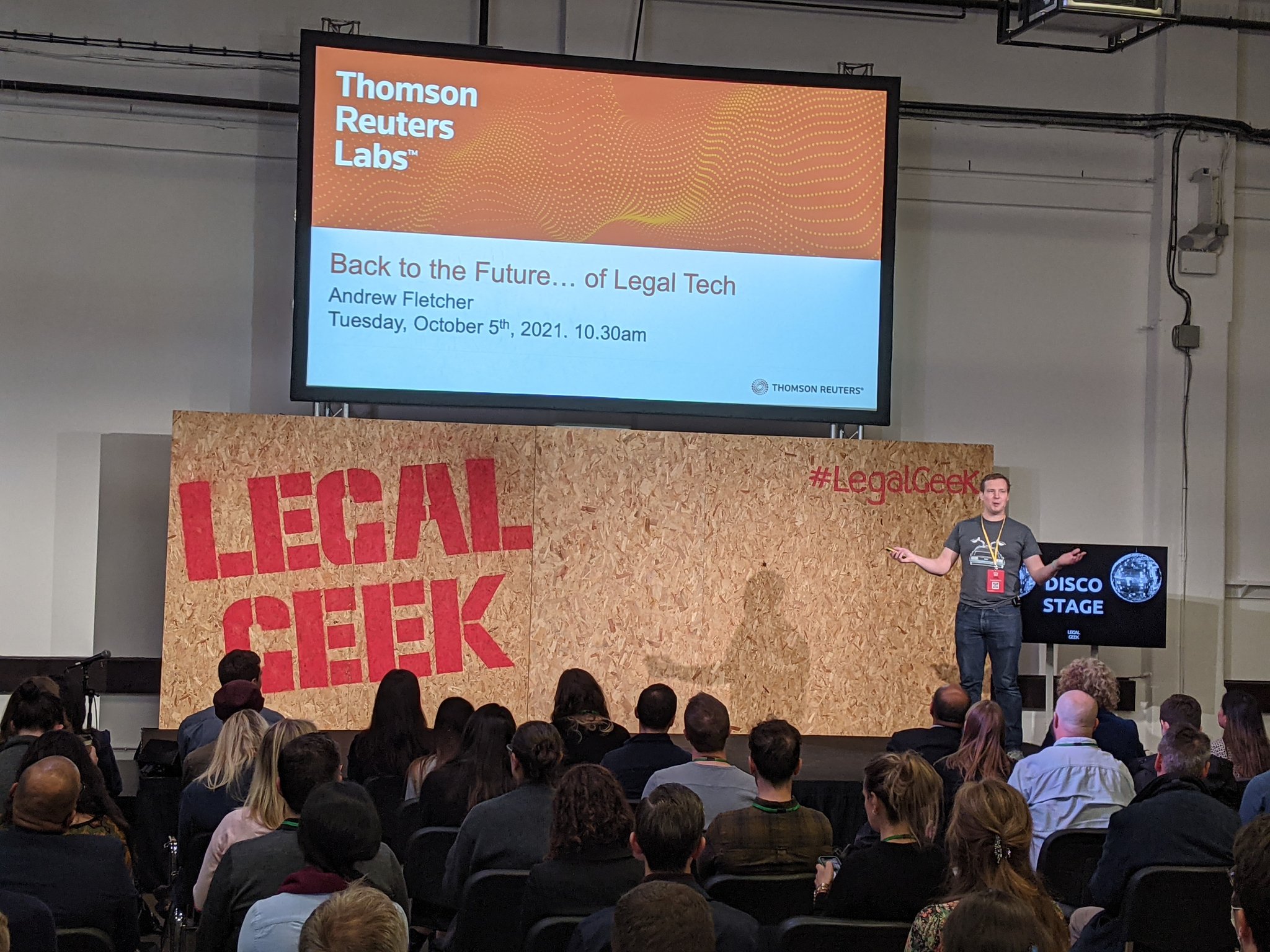Legal Geek London: AI and the Future of Legal Tech

As the Legal Geek Conference continues today, Legal Current is catching up with yesterday’s thought-leadership presenters, including Andrew Fletcher, director of Thomson Reuters Labs. He hosted the TED-style talk, Back to the Future … of Legal Tech.
Fletcher is a fan of the movie “Back to the Future,” and his session included three lessons the movie has for the legal tech space. Legal Current caught up with Fletcher after his session, and below is a recap of the discussion.
Legal Current: How did Thomson Reuters Labs get its start and what are you currently focusing on?
Fletcher: “Thomson Reuters Labs has been around, in slightly different forms, for over 25 years! In the early days, it was the corporate R&D department focused on legal – really pioneering a lot of techniques that enhanced Westlaw and other products. I joined in 2013 and set up a number of labs in different locations, and the organization is now well over 100 people around the globe, focused on solving customer pain points across the products that Thomson Reuters builds. Our team brings together scientists, engineers, designers and project managers to focus on tangible ways we can help our customers, particularly using artificial intelligence and natural-language processing techniques.
I currently focus on two things for our Labs. One is that I work with my colleagues across our legal practice and productivity products, including HighQ, Legal Tracker, 3E, Contract Express and others, to jointly identify opportunities where AI could add value. This is the start to defining the projects that our Labs colleagues then work on. I also run our London customer center, through which we look to meet with and talk to our customers about the projects we are doing and, most importantly, look for opportunities where our customers can collaborate with us on those projects.”
LC: You highlighted Legal Tracker software as an example of how Thomson Reuters Labs is helping corporate legal professionals now and into the future. How has introducing AI components in Legal Tracker helped users better manage their e-billing and invoice review process?
Fletcher: “Last year the Labs started partnering with Legal Tracker to deliver AI components that assist invoice review. One of the first was to be able to identify block billing, but we’ve also gone on to look at other billing issues that we can flag as part of an invoice review. This year and next, Legal Tracker will continue introducing more AI-assisted invoice review, keeping people at the core of the decision making, but with AI identifying any and all deviations from outside counsel billing guidelines. In parallel, we’ve also introduced more data visualizations that will ultimately be paired with more data insights, which will help legal ops professional make better decisions about their whole legal portfolio.”
LC: Another example you noted is HighQ Contract Analysis. How is Thomson Reuters Labs incorporating AI to help legal professionals with the contract review process?
Fletcher: “HighQ Contract Analysis was introduced earlier this year. It’s a fantastic example of where we have co-developed with customers from the very early stages through to product release, and it is still going on. We really focused on where technology can fit with, and assist, legal professionals in actually answering the questions they need when reviewing a contract. There’s lots more coming, in particular an AI Model Trainer to bring support into your use cases so you can understand when AI models will work and when they need adapting.”
LC: How does Thomson Reuters Labs partner with customers to solve pain points for legal professionals?
Fletcher: “Our work with Legal Tracker and HighQ Contract Analysis both had customers deeply involved from the very early stages. Not every customer conversation at Thomson Reuters involves the Labs, of course, but we have a remit that enables really quite open conversations with customers. When we meet with customers, we talk about work that is ongoing, or just getting started, so it’s very tangible and clearly connected to what will be a future product feature. But we also step back and have conversations to understand other unmet needs and to explore those more deeply. Our customers find it quite valuable to have those type of conversations, and in particular to do that with scientists, designers and engineers who can seek to understand the challenges wrapped up in an idea. When I picked my theme for Legal Geek, I really wanted to emphasize the future. Yes, we want things to be grounded and tangible, but we also want to think big and understand where we want to get to beyond the immediate opportunity.”
LC: What’s one thing you want everyone to know about Thomson Reuters Labs?
Fletcher: “We’re here and we want to talk to you! What has always struck me about the Legal Geek conference – and what the conference organizers take pride in – is that they are a community that works together to meet the needs of legal professionals. So, if you are curious to hear what Thomson Reuters Labs is working on, and you’d like to have an open conversation and share your priorities and needs, then reach out and get in touch. Let’s make the future we want, together!”